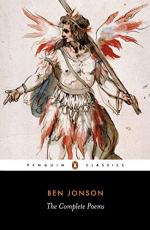|
This section contains 328 words (approx. 1 page at 400 words per page) |

|
On My First Son (Poem) Summary & Study Guide Description
On My First Son (Poem) Summary & Study Guide includes comprehensive information and analysis to help you understand the book. This study guide contains the following sections:
This detailed literature summary also contains Quotes and a Free Quiz on On My First Son (Poem) by Ben Jonson.
The following version of this poem was used to create this guide: Jonson, Ben. "On My First Son." The Complete Poems (Penguin, 1988).
Note that parenthetical citations within the guide refer to the lines of the poem from which the quotations are taken.
Ben Jonson was one of the most popular playwrights of Elizabethan and Jacobean England. Often considered second only to William Shakespeare, Jonson was a prolific writer who composed a number of comedies, tragedies, and histories throughout his lifetime. He is best known for his contributions to the genre of city comedy, or plays that represented ordinary, working-class people (often Englishmen) rather than royalty or notable historical figures from other European nations. Jonson's plays delight in both celebrating and mocking the adventures of the everyman, and he is often studied for his subtle sarcasm, irony, and sharp wit.
Jonson's poetry features many of the same elements of his plays. Nearly all of his poems contain elements of irony and subtle critique, with nods toward political activism appearing in some of the more seemingly innocuous verse. Critics have long considered Jonson's poems an exemplar of double meaning, as they often challenge readers to question the speaker's allegiances as they unfold with both ambiguity and hyperbole.
"On My First Son" was written in 1603 but was not published until 1616 in Jonson's first collected folio The Works of Benjamin Jonson. The poem represents a marked departure from Jonson's signature sarcasm. It is an elegy—a poem that laments the death of another person—written to mourn Jonson's son, Benjamin, who died of the plague when he was only seven years old. The poem offers a stark and realistic portrait of grief, as the speaker (in this case, clearly Jonson himself) wonders whether he will ever recover from such a tragedy. Critics have long studied the poem for its sincere representation of loss amidst a poetic career typically associated with deft irony and biting social and political critique.
Read more from the Study Guide
|
This section contains 328 words (approx. 1 page at 400 words per page) |

|



